Are you curious about the future of healthcare? Have you ever wondered how medical clinics could be more innovative and accessible? If so, then the future is here! Shipping container medical clinics are revolutionizing the way healthcare is delivered.
Shipping container medical clinics are changing the way healthcare is delivered. However, there are both advantages and disadvantages to consider.
This article will explore examples of container clinic projects, as well as the pros and cons of this revolutionary concept.
Get ready for an exciting journey into the future of healthcare!
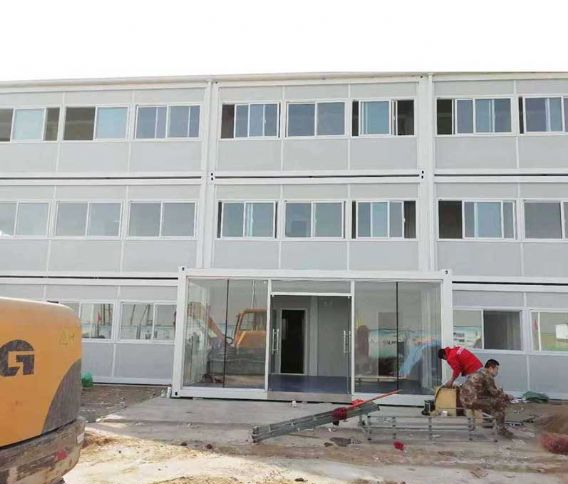
Flatpack Modular Hospital by TD Container House
Key Takeaways
- Shipping container medical clinics/hospitals are revolutionizing healthcare delivery due to their affordability, portability, and customization options.
- These mobile clinics are designed to be compact and portable. They come with cutting-edge technology and offer a range of usage possibilities, such as disaster relief or remote areas where medical access is limited.
- Each container clinic is equipped with all the essential features, such as exam rooms, waiting areas, and laboratories.
- These clinics offer clear advantages such as cost-effectiveness, flexibility, and quick deployment, with more innovative solutions emerging.
- Container clinics exemplify simple, efficient, and affordable healthcare solutions that provide access even in remote areas, making them ideal for the future of healthcare delivery.
- While there are some drawbacks, the potential for improving accessibility and efficiency in healthcare is undeniable, and shipping container medical clinics are shaping the future of healthcare for the better.
What Is A Modular Medical Clinic/Hospital?
A modular clinic/hospital is a revolutionary concept that can provide medical care in remote areas or disaster sites with limited access to medical facilities.
Modular clinics/hospitals are designed to be flexible, scalable, and customizable according to specific healthcare requirements.
They offer advantages such as faster construction, cost efficiency, and the ability to easily adapt or expand the clinic as needed.
These clinics/hospitals can be used to provide a wide range of medical services, from primary care to specialized treatments, and they are particularly useful in remote or resource-constrained areas where traditional construction may be challenging.
The modular design of these clinics makes them easy to transport and set up quickly, making them ideal for emergency situations.
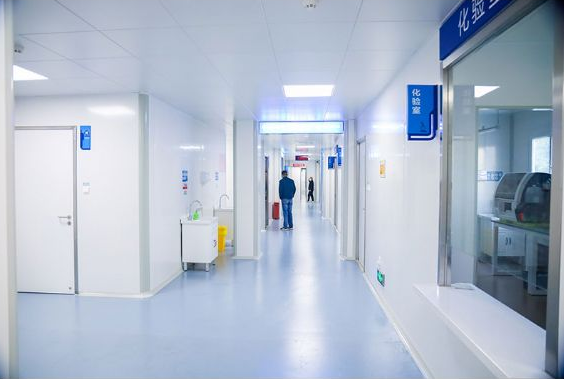
Flatpack Mobile Container Hospital by TD Container House
Clinics And Hospitals Made From Shipping Containers
A shipping container clinic and/or hospital is a type of medical facility that uses shipping containers as the main building material.
These containers are transformed into fully functional clinics or hospitals equipped with medical equipment and essential facilities to provide healthcare services.
Shipping container clinics and hospitals are designed to be portable, cost-effective, and customizable, making them an attractive solution to deliver healthcare in remote or underserved areas.
These container care clinics/hospitals contain all the necessary medical equipment and facilities for onsite care, allowing healthcare professionals and their non-profit partners to bring vital services to those in need.
This type of mobile medical solution can improve access to healthcare and save lives in difficult environments. By bringing medical care directly to those who need it, modular clinics are transforming the way healthcare is delivered in challenging situations.
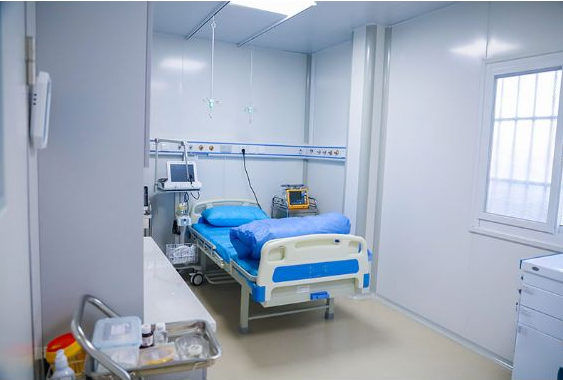
Flatpack Mobile Container Hospital by TD Container House
Versatile Applications of Modular Clinics
Modular clinics and hospitals are important for several reasons. First, they provide a flexible solution to deliver medical care in various situations, such as during disasters, outbreaks, and in remote or inaccessible areas.
These medical units are highly portable and can be quickly set up in any location, making them ideal for low patient density areas, conflict zones, and harsh climates.
They are designed to withstand extreme weather conditions and require minimal on-site construction.
In addition, modular clinics and hospitals offer specialized isolation or quarantine areas for contagious diseases. This feature provides an effective barrier to protect other patients and healthcare workers from potential spread.
It is especially crucial during outbreaks or pandemics when containing the disease is a top priority. These clinics are also beneficial for employees working in remote areas for extended periods, ensuring they have access to necessary healthcare services.
Furthermore, they serve as an ideal stopgap solution during hospital renovation projects when traditional medical spaces are limited.
They help ensure that vital healthcare services continue to reach those who need them most, even in challenging circumstances. By providing a temporary healthcare facility, modular clinics help bridge the gap and maintain the delivery of essential medical care.
Modular clinics and hospitals play a vital role in addressing the urgent need for healthcare services in various situations.
By providing access to medical care in challenging circumstances, these clinics help ensure that healthcare services reach those who need them most.
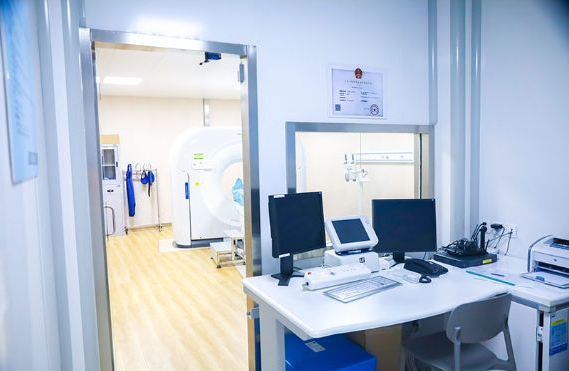
Flatpack Mobile Container Hospital by TD Container House
Modular Clinics Usage Options
Modular clinics are a versatile and convenient solution for medical purposes. They provide a mobile healthcare option that can be transported to remote areas.
These clinics offer a variety of services, from dental care to isolation rooms, primary care, and maternity care.
Telemedicine suites are also available, allowing real-time video consultations with doctors. The clinics are equipped with the necessary medical equipment and supplies to provide quality healthcare services. Additionally, they can be used as test centers in case of disease outbreaks or food poisoning.
Modular clinics offer a portable health solution that can cater to different medical needs. They are an ideal solution for remote areas and areas where traditional healthcare clinics may not be readily available.
Typical Modular Shipping Container Medical Clinic Features
Typical modular clinic features include:
- Climate control and air quality systems to ensure a comfortable and safe environment for patients and providers.
- Ample storage capacity for medical supplies and equipment.
- Proper electrical wiring and plumbing facilities for seamless functionality.
- Secure entrances to prioritize patient privacy and safety.
- Essential medical furnishings such as examination tables, chairs, and cabinets.
Modular clinics are not only versatile in terms of their design but also adaptable to different environments. They can serve as stationary medical centers in remote areas or as mobile health clinics that can be easily transported to areas in need.
With the inclusion of specialized medical equipment and technology, these clinics can provide high-quality care regardless of location.
Modular clinics are essential in providing healthcare services to underserved communities, ensuring access to care for everyone.
Their efficient design and versatility make them an ideal solution for those seeking a cost-effective way to increase healthcare access.
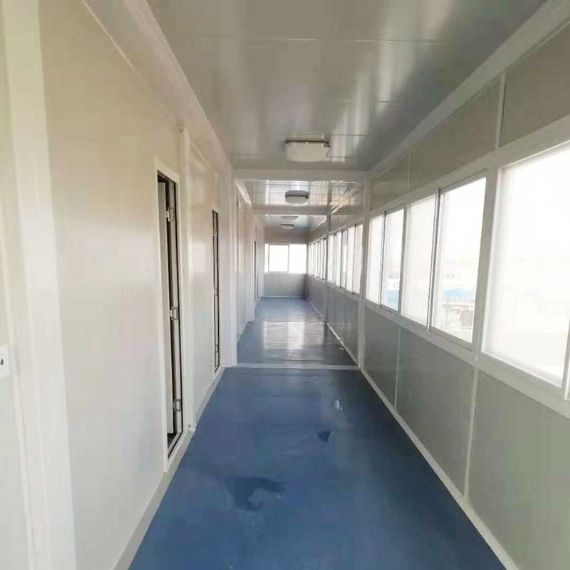
Interior of Flatpack Modular Hospital by TD Container House
Pros of Shipping Container Clinics
Shipping container clinics offer a unique solution for providing medical care to underserved communities. Built from repurposed shipping containers, these clinics are strong, durable, and easily transportable.
This mobility allows for quick deployment, meaning they can become operational within hours of arriving at a destination.
The strength and resilience of these containers make them ideal for transporting medical equipment, supplies, and additional resources to support healthcare providers.
Climate control systems ensure that the air quality is safe for patients, a particularly important factor in areas with limited access to healthcare.
These clinics offer a robust solution for expanding healthcare access to remote and rural areas. By providing safe and reliable medical services, these container clinics improve the quality of healthcare for underserved populations.
Cons of Shipping Container Clinics
Now that we have discussed the pros of container clinics, let’s take a look at some of the potential drawbacks. It is essential to evaluate these cons on a case-by-case basis.
Firstly, shipping containers are quite heavy, weighing around 9000 pounds even before modifications. Despite this, they can often be managed since there is already infrastructure in place for moving them.
Secondly, getting them off delivery trucks can prove challenging due to their weight. As a result, heavy equipment like cranes and forklifts may be required. However, jacks can also be used to lift the containers vertically from the truck chassis and place them on the ground when not in use.
Lastly, the containers are quite narrow, leaving only around seven feet of interior space once insulation and walls are added.
Although this can be limiting, there are still many practical configurations that make the best use of the abundant lengthwise area and create a unique medical clinic.
Container Clinic And Hospital Examples
Shipping containers are increasingly being used to create innovative healthcare facilities. These clinics and hospitals are equipped with medical equipment and supplies, offering efficient and effective healthcare solutions.
The COVID-19 pandemic has further highlighted the potential of shipping containers as healthcare solutions. Mobile testing centers and temporary hospitals have been constructed from shipping containers to help healthcare providers respond quickly and effectively to the crisis.
In addition, some existing hospitals have also incorporated container modules for expansion purposes. This has allowed them to add extra space for patient care or specialized services.
Shipping containers offer quick deployment and flexibility in healthcare, making them an invaluable resource in times of need.
Conclusion
The future of healthcare is here: shipping container medical clinics. These modular clinics offer several advantages, such as flexibility, cost-effectiveness, and the ability to be quickly deployed.
Thanks to their customizable features and portability, they bring healthcare access to even the most remote locations.
However, there are some drawbacks to consider. Despite this, the potential for improving healthcare accessibility and efficiency is undeniable.
With the advancement of technology, more and more innovative solutions like container clinics are emerging. These solutions are expected to shape the future of healthcare delivery.
Shipping container medical clinics are the perfect example of how simple, cost-effective, and efficient healthcare solutions can be.
With their ability to be deployed anywhere and to provide healthcare access to even the most remote areas, they are helping to revolutionize the way healthcare is delivered.
It’s clear that container clinics are changing the future of healthcare for the better. With their flexibility, portability, and cost-effectiveness, they are offering a range of solutions that will help improve healthcare access and efficiency in the years to come.

